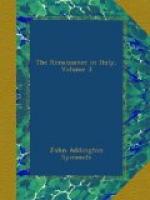Michael Angelo was born in 1475 at Caprese, among the mountains of the Casentino, where his father Lodovico held the office of Podesta. His ancestry was honourable: the Buonarroti even claimed descent, but apparently without due reason, from the princely house of Canossa.[289] His mother gave him to be suckled by a stone-cutter’s wife at Settignano, so that in after days he used to say that he had drawn in the love of chisels and mallets with his nurse’s milk. As he grew, the boy developed an invincible determination towards the arts. Lodovico from motives of pride and prudence opposed his wishes, but without success. Michael Angelo made friends with the lad Granacci, who was apprenticed to Domenico Ghirlandajo, and at last induced his father to sign articles for him to the same painter. In Ghirlandajo’s workshop he learned the rudiments of art, helping in the execution of the frescoes at S. Maria Novella, until such time as the pupil proved his superiority as a draughtsman to his teacher. The rupture between Michael Angelo and Ghirlandajo might be compared with that between Beethoven and Haydn. In both cases a proud, uncompromising, somewhat scornful student sought aid from a master great in his own line but inferior in fire and originality of genius.[290] In both cases the moment came when pupil and teacher perceived that the eagle could no longer be confined within the hawk’s nest, and that henceforth it must sweep the skies alone. After leaving Ghirlandajo’s bottega at the age of sixteen, Michael Angelo did in truth thenceforward through his life pursue his art alone. Granacci procured him an introduction to the Medici, and the two friends together frequented those gardens of S. Marco where Lorenzo had placed his collection of antiquities. There the youth discovered his vocation. Having begged a piece of marble and a chisel, he struck out the Faun’s mask that still is seen in the Bargello. It is worth noticing that Michael Angelo seems to have done no merely prentice-work. Not a fragment of his labour from the earliest to the latest was insignificant, and only such thoughts as he committed to the perishable materials of bronze or paper have been lost. There was nothing tentative in his genius. Into art, as into a rich land, he came and conquered. In like manner, the first sonnet composed by Dante is scarcely less precious than the last lines of the “Paradiso.” This is true of all the highest artistic natures, who need no preparations and have no period of groping.
Lorenzo de’ Medici discerned in Michael Angelo a youth of eminent genius, and took the lad into his own household. The astonished father found himself suddenly provided with a comfortable post and courted for the sake of the young sculptor. In Lorenzo’s palace the real education of Michael Angelo began. He sat at the same table with Ficino, Pico, and Poliziano, listening to dialogues on Plato and drinking in the golden poetry of Greece. Greek literature and




